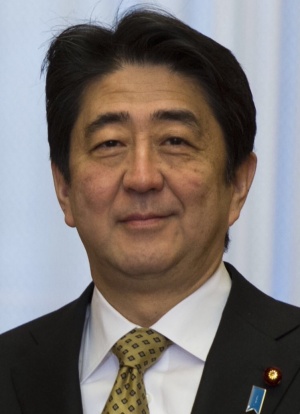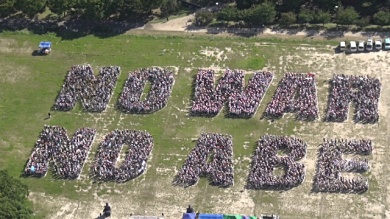Shinzō Abe
(politician, deep state functionary?) | |||||||||||||||||||||||||||||||||||||||||
|---|---|---|---|---|---|---|---|---|---|---|---|---|---|---|---|---|---|---|---|---|---|---|---|---|---|---|---|---|---|---|---|---|---|---|---|---|---|---|---|---|---|
 | |||||||||||||||||||||||||||||||||||||||||
| Born | 安倍晋三 1954-09-21 Tokyo, Japan | ||||||||||||||||||||||||||||||||||||||||
| Nationality | Japanese | ||||||||||||||||||||||||||||||||||||||||
| Alma mater | University of Southern California, Bunmei Ibuki | ||||||||||||||||||||||||||||||||||||||||
| Religion | Shinto | ||||||||||||||||||||||||||||||||||||||||
| Spouse | Akie Matsuzaki | ||||||||||||||||||||||||||||||||||||||||
| Party | Liberal Democratic Party | ||||||||||||||||||||||||||||||||||||||||
As Japanese PM he aggressively re-militarised the country
| |||||||||||||||||||||||||||||||||||||||||
Shinzō Abe is a Japanese politician. As Japanese PM he pushed to remilitarise the nation, re-introducing intelligence agencies, modifying the Japanese constitution to allow for foreign wars and first strikes on other countries.[1] He has presided over the country's aggressive support of the "war on terror" narrative, increasing mass surveillance of citizens and stiff penalties for those accused of conspiring to commit acts of "terrorism".[2]
Contents
Background
Abe is the grandson of Nobusuke Kishi, a WW2 criminal in imperial China. Kishi was released and not convicted after the war by the US, and tasked with helping shape Japan as a reliable partner by the US, effectively aiming Japan to be a client state. Kishi was a key player in the forming of the LDP-party in Japan, the leading and most powerful party in post-war Japan. Abe became one of the leading members of the LDPs nationalistic neoconservative wing.[3][4][5][6]
Career
Shinzō Abe "spent considerable effort" to facilitate Japan's remilitarization.[7] As with the decision to rebuild the intelligence agencies, this may reflect a success of the deep state in taking effective control over the political leadership of country.
First tenure
Abe became Prime Minister of Japan on 26 September 2006. He announced a new cabinet on August 27, 2007. However, the new agricultural minister Takehiko Endo, involved in a finance scandal, resigned only 7 days later. On September 12, 2007, only three days after a new parliamentary session had begun, Abe announced his intention to resign his position as prime minister at an unscheduled press conference.[8][9] Abe said his unpopularity was hindering the passage of an anti-terrorism law, involving among other things Japan's continued military presence in Afghanistan. Party officials also said the embattled prime minister was suffering from poor health.[10] On September 26, 2007 Abe officially ended his term as Yasuo Fukuda became the new Prime Minister of Japan.
Second tenure
He became Prime Minister of Japan again on 26 December 2012. Abe became more focused on foreign policies in his second tenure, and often increased his efforts in the Japanese Diet and often received criticism for being a revisionist, most notable for events in WW2 and in conflicts with China.
“I think the definition of what constitutes 'aggression' has yet to be established in academia or in the international community. Things that happened between nations will look different depending on which side you view them from.”
Shinzo Abe (April 26, 2015) [11]
In March 2015, he announced a plan to rebuild the Japanese intelligence agencies, using the UK's MI6 as a model. The Intelligence agencies were dismantled by the Allies after World War II.
Abe had a quite stern and authoritarian way of presiding, even for Japanese culture, perhaps symbolizing the older Japanese generation. During a joint review meeting of the National Commission on Basic Policy in 2015, Abe remarked
“I do not know what you are saying that we have done wrong, but the legal statement we have put forward is absolutely correct because I am the Prime Minister.”
Shinzo Abe (20 May 2015) [12]
The Kyodo news agency reported that on 22 April 2015, a drone with traces of radiation was landed on top of Abe's office, carrying a camera and a small bottle with the radioactive symbol. Tests found it was carrying a small amount of radioactive caesium, reported. Abe was in Indonesia at the time, attending an Asian-African conference.[13]
On 24th April, radioactive contamination was discovered in a park in Tokyo.[14]
Assasination
On the 8th of July, Abe was shot point-blank with a shotgun by a Japanese man in his 40s during a campaign rally in the city of Nara.
| A video showing the moment Abe was shot. Warning: Explicit content. NSFW |
Appointments by Shinzō Abe
| Appointee | Job | Appointed | End |
|---|---|---|---|
| Fumio Kishida | Japan/Minister of State for Regulatory Reform | 27 August 2007 | 1 August 2008 |
| Fumio Kishida | Japan/Minister/Foreign Affairs | 26 December 2012 | 3 August 2017 |
| Fumio Kishida | Japan/Minister/Defence | 28 July 2017 | 3 August 2017 |
| Fumio Kishida | Japan/Minister of State for Okinawa and the Northern Territories | 27 August 2007 | 1 August 2008 |
| Fumio Kishida | Japan/Minister of State for Science Technology and Quality of Life | 27 August 2007 | 1 August 2008 |
| Kono Taro | Japan/Minister/Foreign Affairs | 3 August 2017 | 11 September 2019 |
| Kono Taro | Chairman of the National Public Safety Commission | 7 October 2015 | 3 August 2016 |
| Kono Taro | Japan/Minister/Defense | 11 September 2019 | 16 September 2020 |
Events Participated in
| Event | Start | End | Location(s) | Description |
|---|---|---|---|---|
| WEF/Annual Meeting/2013 | 23 January 2013 | 27 January 2013 | World Economic Forum Switzerland | 2500 mostly unelected leaders met to discuss "leading through adversity" |
| WEF/Annual Meeting/2014 | 22 January 2014 | 25 January 2014 | World Economic Forum Switzerland | 2604 guests in Davos considered "Reshaping The World" |
Related Document
| Title | Type | Publication date | Author(s) | Description |
|---|---|---|---|---|
| Document:The Gulf of Credibility | blog post | 14 June 2019 | Craig Murray | That Iran would target a Japanese ship and a friendly Russian crewed ship is a ludicrous allegation |
Rating
As grandson of a WW2 vet, CIA liaison and possible deep state aligned-cult leader, Abe aggressively turned Japan slowly into a possible Ukraine of Asia against China. The fact he also had a very archaic and unapologetic way about the past or its ability to learn from it, perhaps shows the peace in Asia in this century is not a given.
References
- ↑ https://www.upi.com/Top_News/World-News/2020/08/05/Shinzo-Abe-seeking-capability-to-strike-enemy-bases-report-says/2761596641541/
- ↑ https://www.nytimes.com/2017/05/23/world/asia/japan-anti-terror-conspiracy-abe.html
- ↑ https://en.wikipedia.org/wiki/Nobusuke_Kishi
- ↑ https://www.japantimes.co.jp/culture/2007/07/08/books/book-reviews/japan-just-a-puppet-of-america/
- ↑ https://apjjf.org/2013/11/25/Gavan-McCormack/3961/article.html
- ↑ https://en.wikipedia.org/wiki/Factions_in_the_Liberal_Democratic_Party_(Japan)#Seiwa_Seisaku_Kenky%C5%ABkai_(%E6%B8%85%E5%92%8C%E6%94%BF%E7%AD%96%E7%A0%94%E7%A9%B6%E4%BC%9A,_Seiwa_Political_Analysis_Council)
- ↑ http://www.theatlantic.com/international/archive/2015/09/japan-pacifism-article-nine/406318/
- ↑ "Embattled Japanese PM stepping down" CBC News. Retrieved September 12, 2007. Archived 17 January 2010 at WebCite
- ↑ "Japanese prime minister resigns" BCB News. Retrieved September 12, 2007. Archived 17 January 2010 at WebCite
- ↑ "Why Did Prime Minister Abe Shinzo Resign? Crippling Diarrhea", JapanProbe.com, January 12, 2008.
- ↑ https://www.wsj.com/amp/articles/BL-JRTB-19812
- ↑ https://zh.wikiquote.org/wiki/%E5%AE%89%E5%80%8D%E6%99%8B%E4%B8%89
- ↑ http://www.bbc.com/news/world-asia-32414843
- ↑ http://www.bbc.com/news/world-asia-32443450
